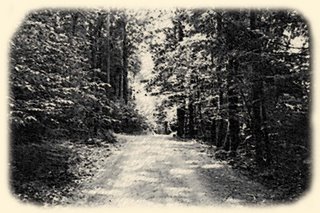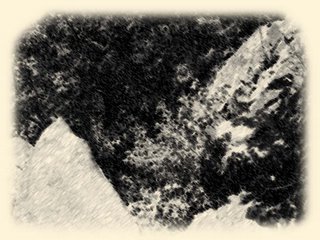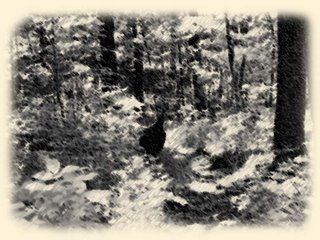Day One Hundred Eleven
This morning I helped get the girls ready to start their day, braiding their hair and helping them locate their socks. By the time I was ready to go downstairs myself, the girls had already gone to feed the chickens, collect eggs, and bring in wood and well water. The older woman with the braids seemed to be in charge of breakfast, and she was giving instructions to the younger women on her crew. The kitchen was a flurry of activity, with chicory brewing, fruit preserves and yogurt being ladled into bowls, and Sharon stirring a big pot of oatmeal on the wood-burning stove.
I’ll eat oatmeal, but I’ve always considered oats more appropriate for horses than for people, so I wasn’t too excited about it until Sharon took the pot off the stove to cool and began stirring in some honey and little reddish flowers from a basket.
I hated to seem nosy, but I couldn’t help myself. “What are those?”
“Redbud.” When she saw I was curious, she added, “Go on and try one.”
I did, and it was good—both sweet and sour at the same time. “Is this a native plant, or something you grow here?”
“There’s a whole woods full of it.” She waved a hand toward the window. “Didn’t you notice when you rode through?”
Now I remembered the colorful buds on some of the trees. I had thought they were pretty, but it hadn’t occurred to me to eat them. “I noticed. I just didn’t know they were food. Do you do a lot of foraging?”
“Of course. The Goddess provides food and medicine, and we would be ungrateful to refuse her gifts.”
“I’ve been wanting to learn about the plants around here. I’ve still got a long way to go, and I’d feel a lot better about it, knowing I could live off the land. You think you could teach me? I can pay.”
She told me that some of the women were going into the forest today, and perhaps I could go along. At breakfast this idea was put to a vote and approved. I would be allowed to hunt for food and medicinal herbs, and would give the group half of what I collected as my payment for the time they would spend instructing me. It seemed fair enough. My biggest concern was that this delay would cost me a day’s travel, but I had been feeling uneasy about not knowing the land. My life, and Flecha’s, could depend on my ability to recognize the difference between helpful and harmful plants, so I couldn’t afford not to take this opportunity.
After breakfast we packed lunches to take with us, and then the woman with the braids, whose name was Eva, led us across the pasture and into the woods. At first we stuck to a clear road.

But this wasn’t where the best herbs and edibles would be found. So after awhile, we moved out onto the narrower deer tracks and even forged our own paths, looking deep in the underbrush, and behind trees and rocks.

Eva was patient with me, naming the plants we saw and explaining their uses. If the plant was in season, we all fanned out and picked some. If not, Eva told me what parts of the plant were useful—bark, leaves, flowers, roots, or seeds—and then described what I should look for in the proper season.
We ended up picking redbud, nettles, early chokecherries, sassafras, witch hazel, and spiderwort. We dug up little wild potatoes called spring beauties, and Eva and Ruth taught me to recognize safe mushrooms. It was a fine way to spend the day, and I had excellent teachers. Late in the afternoon, on our way back to the farm, I saw a wild turkey among the trees.

I wished I had brought my bow and arrow. A turkey dinner would’ve been a nice way to have paid these people back for their kindness to me.
I especially wished I had shot that turkey when I found out what was for supper—squirrel stew. I’m not too proud to eat squirrels, but it seemed silly to do so when there was so much better food around.
After supper we gathered in the common room, where Eva led everyone in a few songs. I didn’t know the words, but I clapped along, and when one of the men brought out a guitar and another wanted me to dance with him, I let him show me some simple steps and twirl me around the room. I was having a very good time, but then Nicholas startled me by suggesting that I provide some entertainment for the group. “We all have to take our turn,” he explained. “It’s tradition.”
I’ve never felt right about singing for people, and I can’t play any instruments, so I told some of the Indian stories from my country, and that seemed to go over well.
“The Native Americans are people of great wisdom and understanding of our Mother Goddess,” Nicholas said.
I thought of the Indians back home—not the ordinary ones like my friend Sachi, and Unitas’ Pueblo contact Musade, but the Nativists. The only thing Nativists understood was revenge. It crossed my mind to point out that not all Indians were deeply spiritual beings, any more than any of us are. But it wasn’t a good time for a debate. Nicholas had his book open and was getting ready to read, so I pulled a fidgety toddler into my lap and smoothed his hair, soothing him to sleep while Nicholas read to us an analysis of a story about Jesus and a mustard seed.
Tomorrow I’m definitely leaving. I’m no expert on the local plants and wildlife after just one day in the woods, but I know enough to supplement the food in my packs with fresh things, and I can also recognize some of the more common plants to avoid. Wildcrafting here isn’t so terribly different from at home. Each place has its own unique plants, but in all, what the people on this farm say is correct. The earth, or Mother Goddess, will provide.
◄ Previous Entry
Next Entry ►
I’ll eat oatmeal, but I’ve always considered oats more appropriate for horses than for people, so I wasn’t too excited about it until Sharon took the pot off the stove to cool and began stirring in some honey and little reddish flowers from a basket.
I hated to seem nosy, but I couldn’t help myself. “What are those?”
“Redbud.” When she saw I was curious, she added, “Go on and try one.”
I did, and it was good—both sweet and sour at the same time. “Is this a native plant, or something you grow here?”
“There’s a whole woods full of it.” She waved a hand toward the window. “Didn’t you notice when you rode through?”
Now I remembered the colorful buds on some of the trees. I had thought they were pretty, but it hadn’t occurred to me to eat them. “I noticed. I just didn’t know they were food. Do you do a lot of foraging?”
“Of course. The Goddess provides food and medicine, and we would be ungrateful to refuse her gifts.”
“I’ve been wanting to learn about the plants around here. I’ve still got a long way to go, and I’d feel a lot better about it, knowing I could live off the land. You think you could teach me? I can pay.”
She told me that some of the women were going into the forest today, and perhaps I could go along. At breakfast this idea was put to a vote and approved. I would be allowed to hunt for food and medicinal herbs, and would give the group half of what I collected as my payment for the time they would spend instructing me. It seemed fair enough. My biggest concern was that this delay would cost me a day’s travel, but I had been feeling uneasy about not knowing the land. My life, and Flecha’s, could depend on my ability to recognize the difference between helpful and harmful plants, so I couldn’t afford not to take this opportunity.
After breakfast we packed lunches to take with us, and then the woman with the braids, whose name was Eva, led us across the pasture and into the woods. At first we stuck to a clear road.

But this wasn’t where the best herbs and edibles would be found. So after awhile, we moved out onto the narrower deer tracks and even forged our own paths, looking deep in the underbrush, and behind trees and rocks.

Eva was patient with me, naming the plants we saw and explaining their uses. If the plant was in season, we all fanned out and picked some. If not, Eva told me what parts of the plant were useful—bark, leaves, flowers, roots, or seeds—and then described what I should look for in the proper season.
We ended up picking redbud, nettles, early chokecherries, sassafras, witch hazel, and spiderwort. We dug up little wild potatoes called spring beauties, and Eva and Ruth taught me to recognize safe mushrooms. It was a fine way to spend the day, and I had excellent teachers. Late in the afternoon, on our way back to the farm, I saw a wild turkey among the trees.

I wished I had brought my bow and arrow. A turkey dinner would’ve been a nice way to have paid these people back for their kindness to me.
I especially wished I had shot that turkey when I found out what was for supper—squirrel stew. I’m not too proud to eat squirrels, but it seemed silly to do so when there was so much better food around.
After supper we gathered in the common room, where Eva led everyone in a few songs. I didn’t know the words, but I clapped along, and when one of the men brought out a guitar and another wanted me to dance with him, I let him show me some simple steps and twirl me around the room. I was having a very good time, but then Nicholas startled me by suggesting that I provide some entertainment for the group. “We all have to take our turn,” he explained. “It’s tradition.”
I’ve never felt right about singing for people, and I can’t play any instruments, so I told some of the Indian stories from my country, and that seemed to go over well.
“The Native Americans are people of great wisdom and understanding of our Mother Goddess,” Nicholas said.
I thought of the Indians back home—not the ordinary ones like my friend Sachi, and Unitas’ Pueblo contact Musade, but the Nativists. The only thing Nativists understood was revenge. It crossed my mind to point out that not all Indians were deeply spiritual beings, any more than any of us are. But it wasn’t a good time for a debate. Nicholas had his book open and was getting ready to read, so I pulled a fidgety toddler into my lap and smoothed his hair, soothing him to sleep while Nicholas read to us an analysis of a story about Jesus and a mustard seed.
Tomorrow I’m definitely leaving. I’m no expert on the local plants and wildlife after just one day in the woods, but I know enough to supplement the food in my packs with fresh things, and I can also recognize some of the more common plants to avoid. Wildcrafting here isn’t so terribly different from at home. Each place has its own unique plants, but in all, what the people on this farm say is correct. The earth, or Mother Goddess, will provide.
◄ Previous Entry
Next Entry ►
1 Comments:
This seems to be the perfect timing for her to move on. It was nice to get into the woods and learn a bit, but no need to become a part of the group. She has become remarkably comfortable with kids.
Post a Comment
<< Home